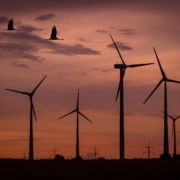Paul Krugman on Limits to Growth: Beware the Bathwater
by Brian Czech
 Congratulations to Paul Krugman, whose New York Times opinion on “Slow Steaming and the Supposed Limits to Growth” hit the bulls-eye of at least one balloon. Landing at Washington-National the very day his opinion column appeared was like crashing back into the growth fetish of the American Fourth Estate. Out came the fresh air of an Australian balloon; back to the polluted, cynical rhetoric that “there is no conflict between growing the economy and protecting the environment.”
Congratulations to Paul Krugman, whose New York Times opinion on “Slow Steaming and the Supposed Limits to Growth” hit the bulls-eye of at least one balloon. Landing at Washington-National the very day his opinion column appeared was like crashing back into the growth fetish of the American Fourth Estate. Out came the fresh air of an Australian balloon; back to the polluted, cynical rhetoric that “there is no conflict between growing the economy and protecting the environment.”
Why the drama with Krugman’s column? Partly due to uncanny timing; partly due to the stark juxtaposition of opinions. Having delivered the keynote address–on limits to growth no less–at the Australian Academy of Science’s annual conference on environmental science, it struck me that decades of careful research could be undermined by the presumptuous pen of a well-placed economist. Something is wrong with that picture.
But only for so long, because those of us who recognize limits to growth have sound science, common sense, and burgeoning evidence on our side. The same cannot be said for Krugman’s opinion.
Krugman got off to a shaky start with the very title of his column. No matter what he could say about “slow steaming,” this was bound to be an article wrong-headed in using one sector (shipping) for drawing broad conclusions about a macroeconomic issue (economic growth). To extend a conclusion from the part to the whole is to commit the fallacy of composition. In this case, it’s a bit like Krugman saying, “Your fingernails keep growing; why not the rest of you too?”
The mistake is common and destructive. When this mistake is made by a highly acclaimed economist in a widely-read opinion, the potential for destruction is multiplied. Politicians hide behind such Pollyannaish opinions to pull out all the stops–fiscal and monetary–for economic growth. The casualties include not only environmental protection but the future economy and ultimately national security.
Next, in Krugman’s lead-in paragraph he laments the “unholy alliance on behalf of the proposition that reducing greenhouse gas emissions is incompatible with growing real GDP.” Already we have two more problems. First, the argument alluded to in the title–that is, refuting limits to growth–is reduced to refuting just one negative impact of growth (that is, climate change). What about all the other impacts and limitations of economic growth: liquidation of natural resources, pollution at large, habitat loss, biodiversity decline, and social side effects such as noise, congestion, and stress?
Second, in a maxed-out, over-stimulated, 90% fossil-fueled economy, Krugman wants us to believe we can grow the economy even more while reducing greenhouse gas emissions. No need to worry about little trends such as tar-sands mining in Canada, coal mining in China, and fracking in the USA. Slower steaming will save the day on climate change, and presumably for the rest of the planetary ecosystem.
Let’s not let Krugman delude us. “Growing real GDP” isn’t about an efficiency gain here and there. It means increasing production and consumption of goods and services in the aggregate. It entails a growing human population and/or per capita consumption. It means growing the whole, integrated economy: agriculture, extraction, manufacturing, services, and infrastructure. From the tailpipe of all this activity comes pollution.
Krugman seems to have fallen for the pixie dust of “dematerializing” and “green growth” in the “Information Economy.” He may want to revisit Chapter 4 of The Wealth of Nations, where Adam Smith pointed out that agricultural surplus is what frees the hands for the division of labor. In Smith’s day that included the likes of candle-making and pin manufacturing. Today it includes everything from auto-making to information processing, but the fundamentals haven’t changed. No agricultural surplus, no economic growth. And agriculture is hardly a low-energy sector.
Adam Smith was among the great, classical economists who readily recognized limits to growth, all the way until at least John Stuart Mill. After that and throughout the 20th century, things got murky for economists as they turned increasingly to microeconomics, losing the forest for the trees. Mr. Krugman appears to be yet another victim of the “neoclassical” evolution of economics. Look to him for insightful opinions on banking regulations, fiscal politics, and other such topics that fit naturally under the rubric of an economics columnist. These are his babies, but beware the bathwater. Take his opinion on limits to growth at your peril, and that of your grandkids.







Krugman is a strange case in economics. He seems well aware of the perils of Austerity, but won’t entertain the other pillars of Modern Monetary Theory. Considering how badly neoliberal economic theory bears up in the real world, any antidote, like MMT should be welcomed. It even works for the conservatives, not just the Left.
Great article.. It drives me crazy when people say we can grow the economy and deal with climate change (or worse – the whole environmental crisis) at the same time. It always relies on exporting emissions overseas (obviously not helping a global problem) and/or waiting with bated breath for a magical technical panacea that hasn’t been invented yet.
People need to wake up to the limits to growth – it’s so simple a child could understand it. It’s just we’re all so clouded by ideology we can’t see it, or we don’t want to because we think that we’re doomed otherwise. I wish steady state and post growth solutions were talked about more in the mainstream media!